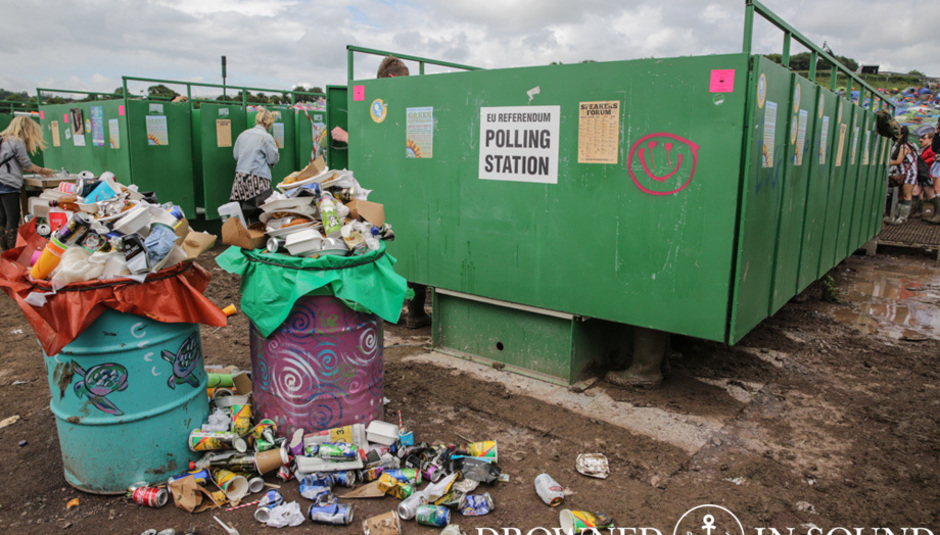There are many landmarks in a young, modern Briton's journey into adulthood. The dull ringing that lingers for days after your first proper gig. That disappointing first election where you vote for student fees to be scrapped only to see them tripled. And of course - truly a rite of passage - that first trip down to Worthy Farm for the world's biggest 'greenfield' festival, Glastonbury. This year it was my turn to battle my way through the mud, and pop my proverbial Glasto cherry.
Summer Of Hate
There’s a special sort of feeling of impending dread en route to Glastonbury 2016. For starters, it’s this writer’s first ever trip to Worthy Farm, and like the rest of this scissored isle, I was weaned on the annual televisual ritual that is the BBC’s coverage of Glastonbury. The surreal feeling of going through the looking glass, and stepping into the reality of the legendary festival, is matched only by the unreal realisation of the EU referendum result. Like a bunch of other fools, my journey takes place early on Friday morning, and stopping over in a rain sodden Bristol to change coaches, there’s time to recharge phones and read through the unbelievable new coverage – or rather to double check in case it was a fevered nightmare from the early start this morning. Once again however, it turns out to be true; 52% of the people that turned up to vote went for Johnson, Gove, and Farage’s hate parade over whatever the Remain camp was supposed to be. The endless stats sting more than the summer rain as I anxiously puff on a sodden fag outside the miserable Bristolian coach station. The majority of voters under 50 years old easily voted to remain. The people of Wales and Cornwall voted so clearly against their own interests to leave the EU and wave goodbye to millions in funding that the Conservative government will never make up. Worst of all – the stat that haunts me the rest of the weekend while navigating throngs of drunk youngsters sporting glittery makeup and equally shiny grins – one poll has a mere 36% of 18-24 actually even bothering to vote.
Anyway, enough of this doom and gloom. Glastonbury is a celebration! It’s a respite from the darker side of Britain, and an opportunity to commune with nature, drink yourself silly, see some of the world’s biggest and best bands, and discover a whole load of new music in the process. Poncho on, and chin up!
Tough Mudders
Now, while Adele and Muse (note: I did not, or perhaps simply could not, bring myself to see Coldplay) were undoubtedly worthy headliners if you’ll excuse the pun, the real star of the show in 2016 was….mud. Not the classic 70s glam rock band behind such hits as ‘Lonely This Christmas’ and ‘Tiger Feet’ – actual mud. Thick, gloopy, sticky, sodden, earthy mud. It’ll-get-all-over-everything-so-don’t-even-try-and-avoid-it mud. The kind of mud that steals your wellies from right off your feet just as you’re in the heart of the busiest crowd making their way to the main stage. A week of brutally heavy rain has taken its toll on the festival site, and every walkway, every spare inch of ground, and perhaps worst of all, the main area in front of the Other Stage, have become muddier than the Somme. Later on some friends who’ve been to Glastonbury some half a dozen times will explain that this is “by far the worst mud they’ve ever seen at Glasto”, assuring us that “normally there’s grass here, honest!” The worst part of the mud is the sheer effort and time it takes to go between stages, turning the already lengthy trudges across the site into epic wading battles with Mother Nature. The big advantage however? The sheer amount of physical exertion over the course of the day sure as hell takes the edge of that next morning’s hangover.
“If in doubt, just wander…”
Pretty soon after one starts walking around the site, the sheer scale of it comes sharply into focus. A mocked up miniaturised terraced street, replete with faux-laundry hanging between faux buildings, surrounds the impressively bassy dub, dancehall, and reggae soundsystem stage oddly called The Blues. As a first ‘bit of festival’ to stumble across it’s instantly fun - and uplifting. Dozens of punters surround a dude dressed up as a hot dog up to his ankles in mud, and they’re all grooving to some early afternoon beats and wobbly bass from one of the stage’s many relentless acts (including Eats Everything and, oddly enough, Ms. Dynamite). Stumbling across these mini surprises, smaller stages, and spontaneous parties never lets up throughout the weekend. Late one evening, we end up in hysterics watching hundreds of tired folk all wearing headphones at a silent disco try stumble their way through the half remembered dance for Whigfield’s vintage slice of cheese, ‘Saturday Night’ – although it takes us a good couple of minutes to work out precisely which song is getting pumped into their ears. A chance right turn off one of the main paths one afternoon, and we find ourselves in hippie paradise, watching Nik Turner - the 75 year-old ex-sax man for Hawkwind – parp his way through a four-hour jam session before a tiny audience. That mythical, unplanned journey around the festival site, summarised on Glastonbury’s website by the mantra, “If in doubt, just wander…”, quickly reveals itself to be a reality. At one point, we wander into a heaving tent only to discover it’s a DJ set by comedian Matt King, in character as Superhans from Peep Show. In that cockney drawl, he announces he thinks he needs to “calm down”, and blazes a massive joint. We all giggle.
Endless Boogie
So the relevance of Glastonbury as a litmus test for the state of modern music seems – at first glance – debatable. Two of the three headliners were formed two decades ago, and the endless array of clubs seem mostly to broadcast decaying forms of drum & bass, jungle, and house. To boot, the ancient Jeff Lynne’s ELO and ZZ Top deliver two of the most memorable sets on the Pyramid Stage, bursting with your mum’s (understably) favourite hits from back in the day, while the Other Stage has LCD Soundsystem and New Order belt out flawless sets of well-worn hits, never risking a single new note of music. The short novella that is the line-up however, reveals a deep inner core of brand new music and boundary-pushing acts. Representing America’s long simmering West Coast jazz scene, saxophonist Kamasi Washington and his utterly stunning band seemingly part the clouds over Sunday lunchtime with the grooviest jazz you’ve ever heard. They blend the best parts of 70s fusion and virtuosity with the recently departed grooves of Prince, and the results are blindingly glorious. Each member of the band (including Kamasi’s own father Rickey Washington who turns up to play flute and sax) is uniformly stunning, but special praise is reserved for keyboard player Brandon Coleman, who stands up for a lengthy and truly epic moog keytar solo; the best of its kind since Herbie Hancock. Elsewhere Floating Points’ live band craft an equally groovy new space between dance music and outright jazz, summoning Britain’s greatest sax player Shabaka Hutchings for a belter of a sax solo. Mac DeMarco and his lovable band of merry pranksters light up the John Peel Stage with an insanely fun and hook-laden set too, dressed as laughably clichéd Canuck fisherman, at one point all playing their guitars behind their head, and even working a cover of Steely Dan’s ‘Reelin' In The Years’ into their set.
Revelations
The anticipation ahead of Adele’s set is palpable. Many thousands in attendance – notably the many families and throngs of young girls – have seemingly resigned themselves to a weekend in this muddy hell hole just for the chance to see the Angel of Tottenham in the flesh. The result is everything they want it to be, from Adele’s infectious, giggly persona (she constantly yells: “Oh my god! Oh my god! I can’t believe it!”), to the set list that includes her key hits alongside the theme from Skyfall, and a brand new song she has to restart after fluffing the first verse. It’s a bit too cutesy for this writer however, and does little to match up with Muse’s set on Friday night.
Having grown up in early Noughties Devon, Muse were like the local band that made it big, but beyond playing along with ‘Knights of Cydonia’ on Guitar Hero, their post-Origin of Symmetry output always had that feel of contrived bombast and unbecoming seriousness, coming to something of a head with the widely laughed at Drones artwork from last year. On the Pyramid Stage however, they actually manage to wear it damn well. Muse may look like a pet project put together by three substitute teachers particularly lacking in charisma, but holy shit they can rock. Matt Bellamy in particular comes across as a blindingly talented mix of Freddie Mercury and Brian May, consistently shredding his way deftly through a dynamic career-spanning set list. Go give Drones’ ‘Reapers’ another listen – Bellamy taps a ridiculously fast intro before navigating his way through several hefty riffs and towering, falsetto choruses. On record it’s laughably camp and bloated; live it’s as magnificent as the gloriously camp prog-rock shows of old, rivalling the likes of Queen of (1980s) Yes. The audience is littered with smatterings of festival goers letting off the odd flare or firework, but by the encores, the Pyramid Stage is belting insane pyrotechnics right into the sky, and showering us with tonnes of confetti. It’s most likely not very green, but it’s one hell of a show. To my very own cynical surprise, Muse are a massive highlight.
Why We Remain
Clichéd as it may be, we emerge from a long night in the underbelly of the festival to clamber our way through the mud one evening/morning and see the sunrise from the Stone Circle. A few hundred people huddle around a fire, and a quartet of hippies have formed a drum circle. There’s a pretty drunk looking guy dressed as a (1971 film version) Oompa Loompa, green-haired and orange skinned. The laughs, good vibes, and gradual sunrise are punctuated by the ugly ‘woosh’ of idiots huffing laughing gas canisters, and I momentarily wonder whether or not these kids bothered voting. If you can’t even commit to a synthetic high that lasts longer that 30 seconds then you might find the two minutes it takes to register to vote a bit of a drag. Gas aside though, it’s a blast, and we go to bed intensely happy, the stone circle having done its work.
So why is Glastonbury special? Equally large throngs head to Barcelona for the sunshine of Primavera, or to the cosier, cleaner fun of Latitude. This mud is hell, truly hell, yet we still empty our wallets and grin our way through Beck’s rain sodden Sunday afternoon set. Why?
Barely at a more perfect time or place, Billy Bragg viciously belts out tunes and furiously talks between songs in the relatively small tent, angry and energised by the referendum result. It’s something of a left-wing religious experience, and I’m actually brought to tears as Billy sings ‘The Few’, originally written in 1991 but now seemingly more relevant than ever:
“Then they go out seeking different colored faces / And anyone else that they can scare / And they salute the foes their fathers fought / By waving their right arms in the air”
It’s a huge moment for everybody there, elevated in its symbolic importance by the festival. Simply put, from its ugly, brown wet ground, to the fires lit high above the Pyramid Stage, Glastonbury is Britain. No other festival is as much a part of our society, or a reflection of it. As such, it’s wet and wild, and it’s cold and unforgiving – but similarly it doesn’t get any better than this right here. As Jeff Lynne and ELO belt out ‘Mr. Blue Sky’ on the utterly overcast and sodden Sunday afternoon, none of the thousands in the crowd bat an eyelid at the irony. They keep calm and carry on, singing and dancing happily beneath their sagging ponchos.
Photo by Tristan Bath






















